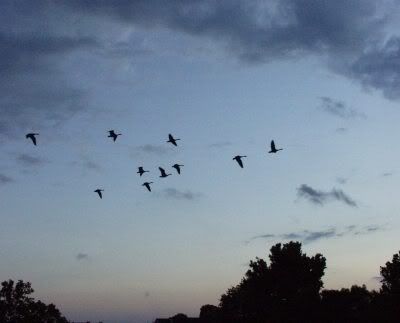
Last night, after a satisfying workout and a shower, I crawled into bed and picked up a worn copy of "Bullfinch's Mythology". Some short time later, I was distracted from reading by a row in the street below. Two drivers shouted empty threats at one another, punctuating their proclamations with horn honks. I looked at the clock: 1:38 AM. I lowered the open book to my chest and stared at the ceiling, waiting for the unnecessary argument to conclude.
Then, I heard it. At first, I believed it an auditory hallucination. It persisted; barely audible, from high above Astoria, Queens, the sound fell to me. I moved to the bedside window to better listen. By happy chance, the angry drivers moved on, leaving 30th Street relatively quiet. The sound came clear then.
The first Canadas of the season - my first Canadas, anyway - were flying overhead. I imagined their pinion feathers quivering and bending in the cold fall air, their long black necks extended as they exchanged flight updates in the familiar "V" echelon.
"You there?"All this, communicated by a steady stream of honk-grunts, a sound impossible to reproduce on the page.
"Yeah, you're still there?"
"Oh, yeah."
"Should we rotate the leader position?"
"Not yet."
"Check."
"Attention! Turn more southwest."
"You there?"
"Yeah, you're still there?"
A profound longing, a stretched sadness, came over me as the big birds passed above, making their way south to Delaware, Maryland, North Carolina, or even my childhood home on the Eastern Shore of Virginia. These birds might well be descendants of Canadas that I hunted years ago, lying on my back in a cold-hardened, fallen corn field with a 12-gauge Browning over-and-under heavy on my chest.
Looking down from several thousand feet, a group of geese would spot our decoy spread and begin a long, beautiful pitch to us, a pitch that might take many minutes and, for some of the birds, would be their last. Hours later, a cooked goose would emerge from the oven, dressed and ready for Thanksgiving dinner. My family never ate turkey.
My thoughts return to the present and, glancing at the book nearby, I recall that geese are said to have alerted the Romans of the Gauls' approach, honking out a warning that allowed Roman soldiers to call for reinforcements, even though they still failed to defend the city against the invading army. Almost 2,400 years later, the Canadas above Queens were providing me with a warning of sorts, or more properly a reminder.
They told me that I need to return to fallow winter fields, to lie motionless as cold burns my exposed face and frozen corn stalks rudely stab my lower back. As the birds begin their descent, even breathing slows; only eyes track the existential marvel of Canadas and snows noisily and clumsily finding ground around my body. Whether or not I rise with my gun is unimportant; in fact, I doubt I will carry one into the field many more times. What matters is the erasure of any and all separation, the highlighting of the intimate connection I share with the geese, the field, the morning.
Later, inside the house, huddled around the firestove, my hands burn as they adjust to the warmth and coffee is brewing and people are laughing and we all wear too-heavy woolen clothes and boots. Outside, the geese number in the thousands; they clamor skyward from the saltwater marshes that lie between the barrier islands and the peninsula. The birds break into their loose, hungry skeins and head inland, circling high before pitching into fields to feed. All the while they call. If you are less fortunate than I, still in bed at dawn when the birds take wing, you will likely be awoken by their blanket of sound.
They call on those winter Virginia mornings just as they called over Queens last night, though with many more voices. The birds fade away south from my New York apartment. I roll away from the window, turn out the light and go to sleep happy.
Photo credit: www.highgrove.com, 2005

2 comments:
This is a very pretty post. I don't know how else to phrase it...
Beautiful post indeed.
Post a Comment